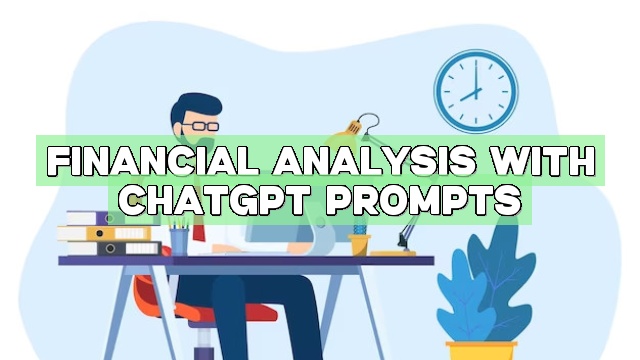Financial reports can be overwhelming and time-consuming to analyze, especially for those without a background in finance. However, with the advancement of technology, AI-powered tools like ChatGPT prompts can help businesses quickly extract valuable insights from financial reports.
ChatGPT prompts can be used to interact with ChatGPT, a language model AI that can understand and generate human-like text. By inputting prompts, ChatGPT can provide responses that help businesses better understand their financial reports.
Key Takeaways:
- ChatGPT prompts can assist businesses in making data-driven decisions by analyzing financial reports.
- ChatGPT is an AI-powered tool that can generate human-like text and assist with financial analysis.
Understanding ChatGPT and Prompts
Before delving into the benefits of using ChatGPT prompts for financial analysis, it’s essential to understand what ChatGPT is and how prompts work.
ChatGPT is an artificial intelligence language model created by OpenAI that can produce natural language text responses to prompts. It uses deep learning algorithms to analyze large amounts of data and generates coherent responses to user input. This technology has been trained on a massive dataset of text, which enables it to understand the context and meaning of words and phrases.
Prompts are short phrases or questions that users input into ChatGPT to receive a response. These prompts can be customized to suit various needs, including financial analysis. The responses generated by ChatGPT are based on the context of the prompt and can provide insights that may not be immediately apparent from static financial reports.
How Prompts enhance understanding of financial reports
Prompts allow users to receive quick answers to specific questions about financial reports. For example, instead of scanning through pages of spreadsheets and trying to decipher complex data, users can input a prompt such as “What is the revenue trend for the last quarter?” and receive a concise response from ChatGPT.
Furthermore, prompts can enable users to drill down into specific areas of interest. For instance, a prompt such as “What is the percentage of revenue from product X compared to product Y?” can help users identify which products are driving revenue growth and focus their attention on those areas.
The use of prompts in financial analysis has the potential to save significant time and resources while also providing valuable insights that may not be immediately apparent from static financial reports.
Importance of Financial Reports
Financial reports are essential tools for assessing a company’s financial performance and position. They provide an overview of a company’s financial activities, including revenues, expenses, assets, and liabilities, over a specific period. Financial reports play a critical role in helping businesses make informed decisions based on their financial health and future prospects.
There are three main types of financial reports: balance sheets, income statements, and cash flow statements. Balance sheets provide details on a company’s assets, liabilities, and equity. Income statements detail a company’s revenues and expenses, and cash flow statements outline the inflow and outflow of cash in a particular period. Each of these reports is designed to provide a different perspective on a company’s financial performance and health.
Enhancing Financial Analysis with ChatGPT
ChatGPT can be a valuable tool for financial analysis. AI technology has the ability to process vast amounts of data and offer insights that might be overlooked by human eyes. By using ChatGPT prompts to interact with financial reports, analysts can quickly and efficiently identify trends, patterns, and anomalies in the data.
One of the key advantages of using ChatGPT for financial analysis is that it can streamline the process and increase accuracy. Rather than spending hours poring over spreadsheets and manually identifying trends, ChatGPT can quickly extract the relevant data and provide meaningful insights. This allows analysts to spend more time interpreting the data and making informed decisions, rather than simply gathering and organizing information.
Advantages of Using AI Technology for Financial Analysis
Another advantage of using AI technology for financial analysis is that it can help to eliminate bias. Human analysts may unintentionally bring their own perspectives and biases to the table when interpreting data. ChatGPT, on the other hand, is not influenced by personal biases and can provide objective insights based solely on the data.
Additionally, ChatGPT can be used to analyze data in real-time, providing up-to-the-minute information that can inform decision-making. This can be particularly valuable in fast-paced industries where quick decisions are necessary.
Overall, using ChatGPT for financial analysis can help businesses make more informed decisions based on accurate, objective data. By leveraging AI technology, analysts can quickly and efficiently identify patterns and trends in financial reports, ultimately leading to improved business outcomes.
ChatGPT Prompt Examples for Financial Reports
ChatGPT prompts can be used to extract valuable insights from financial reports. Here are some examples of prompts that can be used:
| Prompt | Response |
|---|---|
| What is the revenue trend for the last five years? | Revenue has steadily increased every year for the past five years, with a 15% growth rate in the last year. |
| What is the current debt-to-equity ratio? | The current debt-to-equity ratio is 0.75. |
| How much does the company spend on research and development annually? | The company spends approximately 10% of its revenue on research and development annually. |
By using ChatGPT prompts like these, financial analysts can quickly and easily gather information from financial reports, allowing for more efficient and informed decision-making.
Using ChatGPT Prompts for Complex Financial Tasks
ChatGPT prompts can be incredibly beneficial when it comes to tackling complex financial tasks. While prompts for simple tasks may provide immediate answers, more complex tasks require a bit more finesse when it comes to crafting effective prompts.
One strategy for creating prompts for complex tasks is to provide background information. This helps ChatGPT understand the context and enables it to provide more accurate and informed responses. For example, consider a scenario where a company is looking to expand into a new market:
Company XYZ is considering expanding into a new market. Can you provide insights on the financial risks and potential profitability of this expansion?
By including the context of the company’s expansion plans, ChatGPT can better understand the nuances of the request and provide a more targeted response. This not only saves time in sifting through data manually but also ensures greater accuracy in the analysis.
Another technique for using ChatGPT prompts for complex financial tasks is to break down the task into smaller, more manageable components. This can help to ensure that ChatGPT doesn’t become overwhelmed and that the responses are focused and relevant. Consider the following prompt:
Can you provide insights on the financial risks associated with the proposed acquisition of Company ABC by Company XYZ?
This prompt may be too broad for ChatGPT to provide a comprehensive response. Breaking the prompt into smaller components, such as financial risks associated with the acquisition or a profitability analysis of the merged companies, can lead to better results.
In conclusion, utilizing ChatGPT prompts for complex financial tasks requires a bit more effort but can lead to significant benefits in terms of accuracy and efficiency. By providing context and breaking down tasks into manageable components, ChatGPT can provide valuable insights that can inform important business decisions.
Advantages of Using ChatGPT for Financial Reporting
While financial reports can be complex and time-consuming to create, they are essential for ensuring business success. Fortunately, ChatGPT prompts can revolutionize the financial reporting process and offer several advantages:
- Increased efficiency: With ChatGPT, companies can automate the reporting process and generate reports in record time. This saves both time and money, allowing companies to allocate resources more effectively.
- Improved accuracy: ChatGPT utilizes AI technology to analyze financial data, which can significantly reduce the risk of human error. This ensures that reports are accurate and consistent across all areas of the business.
- Enhanced insights: ChatGPT prompts extract insights from financial data that may have gone unnoticed before, providing businesses with a more comprehensive view of their financial performance and enabling data-driven decision-making.
Overall, the use of ChatGPT prompts in financial reporting can result in a more efficient, accurate, and insightful reporting process, allowing companies to make informed decisions and achieve long-term success.
Best Practices for Using ChatGPT Prompts in Financial Analysis
While using ChatGPT prompts can greatly enhance financial analysis, it is important to follow best practices to optimize results and avoid potential pitfalls. Here are some tips for effectively utilizing ChatGPT prompts in financial analysis:
- Provide Specific and Targeted Prompts: ChatGPT works best with specific and targeted prompts. Rather than inputting a general question, provide detailed information such as specific financial data or the particular aspect of the report you would like to analyze. This will increase the accuracy and relevance of the response.
- Ensure Quality of Input Data: The quality of input data directly affects the quality of ChatGPT’s responses. Ensure that financial data and reports are accurate and of high quality. This will improve the accuracy of ChatGPT’s responses and prevent incorrect analysis.
- Perform Cross-Checking: While ChatGPT can provide valuable insights, it is important to perform cross-checking and analysis with other sources. This will ensure accuracy and prevent errors in analysis.
- Use Appropriate Language: ChatGPT is programmed to understand natural language, so using conversational language is appropriate. However, using overly complex or technical language may lead to inaccurate or irrelevant responses. It is important to use language that ChatGPT can easily understand.
- Understand Limitations: While ChatGPT can provide valuable insights, it is important to understand its limitations. While it can provide insights and analysis on financial reports, it cannot provide financial advice or make financial decisions. It is important to use ChatGPT as a tool for analysis, not as a replacement for human judgment and expertise.
By following these best practices, you can effectively utilize ChatGPT prompts for financial analysis and unlock the full potential of AI technology for data-driven decision-making.
Case Studies: Real-Life Examples of ChatGPT in Financial Analysis
Real-life examples of ChatGPT being used in financial analysis demonstrate the power of this AI technology to provide accurate and insightful reports. Here are two case studies that showcase the effective application of ChatGPT prompts:
Case Study 1: Using ChatGPT for Predictive Financial Modeling
A financial services company was looking for an efficient way to conduct predictive financial modeling. They used ChatGPT to generate detailed financial reports and insights. By training the system on historical data, the company was able to use ChatGPT to provide accurate predictions for future trends.
The ChatGPT prompts allowed the company to identify key drivers of financial performance and adjust their strategy accordingly. ChatGPT was able to provide fast and accurate responses to complex queries, allowing the company to make data-driven decisions with confidence.
Case Study 2: ChatGPT for Automated Financial Analysis
A large corporation was struggling with the time-consuming task of financial analysis. They turned to ChatGPT to automate the process and improve accuracy. By training the system on their specific financial data, ChatGPT was able to provide detailed and accurate reports in seconds.
The company used ChatGPT prompts to extract specific insights from the financial reports. This allowed them to identify trends and patterns that were not immediately obvious. By using ChatGPT for automated financial analysis, the company was able to streamline their reporting process and make data-driven decisions with greater speed and accuracy.
Conclusion: Unlock the Power of ChatGPT for Financial Reports
In conclusion, ChatGPT prompts offer an innovative way to unlock value from financial reports. By leveraging AI technology, businesses can gain valuable insights that can inform sound decision-making.
We have seen how ChatGPT prompts can enhance financial analysis by providing a streamlined approach to data extraction and processing. They can be used for complex financial tasks, thereby freeing up time and resources for more value-added activities.
Financial reports are crucial components for businesses, as they provide a snapshot of the health and performance of the organization. Using ChatGPT prompts for financial reporting allows for more accurate and efficient reporting, reducing errors and improving transparency.
To make the most out of ChatGPT prompts for financial analysis, keep in mind some best practices. It’s important to optimize prompts for better results, and to avoid potential pitfalls that may lead to inaccurate analysis.
Real-life case studies demonstrate the potential and benefits of using ChatGPT prompts in financial analysis. By adopting AI technology and leveraging it for financial reporting, businesses can gain a competitive advantage and stay ahead of the game.
In summary, ChatGPT prompts can transform financial reporting and analysis. They offer a powerful tool for extracting insights and making data-driven decisions. By unlocking the power of ChatGPT, businesses can achieve greater efficiency, accuracy, and competitiveness in the marketplace.
FAQ
Q: What is ChatGPT?
A: ChatGPT is a language model developed by OpenAI that uses artificial intelligence to generate human-like text responses. It can understand prompts and generate relevant and coherent answers.
Q: How are prompts used with ChatGPT?
A: Prompts are used to interact with ChatGPT. Users provide a prompt, which can be a question or instruction, and ChatGPT generates a response based on the given prompt. The quality and relevance of the response depend on the clarity and specificity of the prompt.
Q: How can ChatGPT enhance understanding of financial reports?
A: ChatGPT can enhance understanding of financial reports by providing insights and analysis based on prompts. Users can ask specific questions about the reports or request explanations for complex concepts, allowing for a deeper understanding of the financial information.
Q: What are the key components of financial reports?
A: Financial reports typically consist of balance sheets, income statements, cash flow statements, and statements of shareholders’ equity. These components provide information about a company’s financial position, performance, and cash flow.
Q: How can ChatGPT be used to enhance financial analysis?
A: ChatGPT can be used to enhance financial analysis by providing additional insights, explanations, and perspectives. It can help identify patterns, trends, and anomalies in financial data, making it a valuable tool for decision-making and strategic planning.
Q: What are the advantages of using AI technology for analyzing financial reports?
A: AI technology, such as ChatGPT, offers several advantages for analyzing financial reports. It can process large amounts of data quickly, identify patterns that may be overlooked by humans, and provide unbiased analysis. Additionally, it can free up time for analysts to focus on more strategic tasks.
Q: Can you provide examples of ChatGPT prompts for financial reports?
A: Sure! Here are a few examples of prompts that can be used with ChatGPT to extract insights from financial reports:
– “What are the major drivers of revenue growth in the last quarter?”
– “Can you explain the trend in operating expenses over the past year?”
– “What is the impact of changes in exchange rates on the company’s financial performance?”
Q: How can ChatGPT prompts be used for complex financial tasks?
A: ChatGPT prompts can be utilized for complex financial tasks by providing detailed instructions and background information. By including relevant context and specifying the desired analysis, ChatGPT can generate comprehensive responses that address the complexities of the task at hand.
Q: What are the advantages of using ChatGPT for financial reporting?
A: Using ChatGPT for financial reporting offers several advantages. It can streamline the reporting process by automating certain tasks, improve accuracy by reducing human error, and provide consistent and standardized reporting across different entities and periods.
Q: What are some best practices for using ChatGPT prompts in financial analysis?
A: To effectively use ChatGPT prompts in financial analysis, consider the following best practices:
– Be clear and specific in your prompts.
– Avoid ambiguous or vague instructions.
– Validate the generated responses by cross-referencing with reliable sources.
– Continuously refine and iterate the prompts to achieve desired results.
Q: Are there any real-life examples of ChatGPT in financial analysis?
A: Yes! Real-life case studies have demonstrated the successful application of ChatGPT prompts in financial analysis. These case studies highlight the valuable insights gained, improved decision-making, and time savings achieved through the use of ChatGPT.









